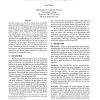Free Online Productivity Tools
i2Speak
i2Symbol
i2OCR
iTex2Img
iWeb2Print
iWeb2Shot
i2Type
iPdf2Split
iPdf2Merge
i2Bopomofo
i2Arabic
i2Style
i2Image
i2PDF
iLatex2Rtf
Sci2ools
114
click to vote
HPDC
1995
IEEE
1995
IEEE
Disk-Directed I/O for an Out-of-Core Computation
New file systems are critical to obtain good I/O performance on large multiprocessors. Several researchers have suggested the use of collective file-system operations, in which all processes in an application cooperate in each I/O request. Others have suggested that the traditional lowlevel interface (read, write, seek) be augmented with various higher-level requests (e.g., read matrix). Collective, high-level requests permit a technique called diskdirected I/O to significantly improve performance over traditional file systems and interfaces, at least on simple I/O benchmarks. In this paper, we present the results of experiments with an “out-of-core” LU-decomposition program. Although its collective interface was awkward in some places, and forced additional synchronization, diskdirected I/O was able to obtain much better overall performance than the traditional system.
Distributed And Parallel Computing | HPDC 1995 | I/O Request | Simple I/o Benchmarks | file Systems |
| Added | 26 Aug 2010 |
| Updated | 26 Aug 2010 |
| Type | Conference |
| Year | 1995 |
| Where | HPDC |
| Authors | David Kotz |
Comments (0)

